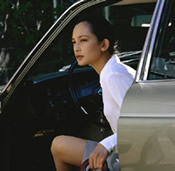Buying vs. Leasing a Car? What Should I do?
By
BJ Killeen
 Straight
out, the buy-vs-lease query is second in the world of questions
only to the chicken and the egg quandary. And, honestly, whether
to purchase or lease is a subject that takes more in-depth
coverage than can be dealt with in this article. It takes
a book (and a good one at that) called "The Complete
Idiot's Guide to Buying or Leasing a Car," by Jack R.
Nerad (Published by Macmillan Spectrum/ Alpha; available in
bookstores nationwide). Straight
out, the buy-vs-lease query is second in the world of questions
only to the chicken and the egg quandary. And, honestly, whether
to purchase or lease is a subject that takes more in-depth
coverage than can be dealt with in this article. It takes
a book (and a good one at that) called "The Complete
Idiot's Guide to Buying or Leasing a Car," by Jack R.
Nerad (Published by Macmillan Spectrum/ Alpha; available in
bookstores nationwide).
The
book is well written, easy to follow, and full of the answers to all the questions
you may have about this subject. But if you're looking for some quick help, here
are the highlights so you'll have some idea which way to go and how to start in
order to get there.
First, the basics.
Regardless of whether you purchase or lease, know what vehicle you want to look
at. If you need a minivan but there's a good lease deal on a Mazda Miata, don't
let your wants overrule your needs. This is a buyer's market, and has been for
some time, with over 500 different models to choose from; you're making the rules
as far as choices and prices go. And there's a great selection of every type of
vehicle-somewhere in there is a good deal on the vehicle of your choice. The only
exceptions are cars that are limited production and are hot on everyone's "gotta
have it" list, such as the new MINI or the Ford Thunderbird.
You've selected the vehicle, now figure out if it fits into
your lifestyle. What I
mean is, how much driving do you do a year? How hard are you
on your vehicles? What's your driving record? How important
is image to you? Most leased vehicles come with annual mileage
limits, usually between 12,000 to 15,000 miles a year maximum. If
you exceed that, you'll pay extra when the vehicle is turned
in.
So
if you consider the drive-through window at McDonald's your
second home, perhaps you need to purchase instead of lease.
Do you just shrug when you find gum smashed into the rear
seat, and smile when your favorite uncle burns another cigarette
hole in the carpet?
Again,
a leased vehicle allows normal wear and tear, but it will cost you to fix the
"lifestyle" additions you've made while driving the leased car. Insurance
companies also require leased vehicles to carry the maximum coverage in all categories,
including collision, so keep in mind that you have no choice when it comes to
premiums. And
finally, your image. One of the major benefits
of a leased vehicle is that you can get something new every two or three years
and always look successful. If you're a high-powered attorney or a financial consultant
and need to maintain an image, this might just be the way to go. Now
that you're somewhat closer to making a decision, take a look at your finances.
The biggest difference between buying and leasing is that you can get into a lease
deal with little or no money down, but then you're not building any equity in
the vehicle as you are when you purchase straight out. On
the plus side of leasing, you probably can afford a much nicer car with more amenities
than if you purchased. With today's climate of zero-percent or low-percent financing,
outright buying a vehicle over leasing has never been more attractive. Other
factors come into play as well. Some people have trouble dealing with the purchase
price haggling treatment, and lease deals usually are set at a specific price
for a specific car. Plus, you don't have to hassle with selling your vehicle when
you decide to buy a new one; you just turn in the leased car.
If
specified in the lease that at the end of the term you like
the car so much you can't part with it, you can buy it then,
by coming up with the cash or refinancing through the dealership,
or other financial institution. It's like buying a used car,
with you as the original owner.
Again,
this is just a quick way to help you determine which choice
will work best for you. For more detailed information, read
up on all the terminology in lease details, sit down and figure
out what you want and need, and make the decision that best
suits your needs.
|